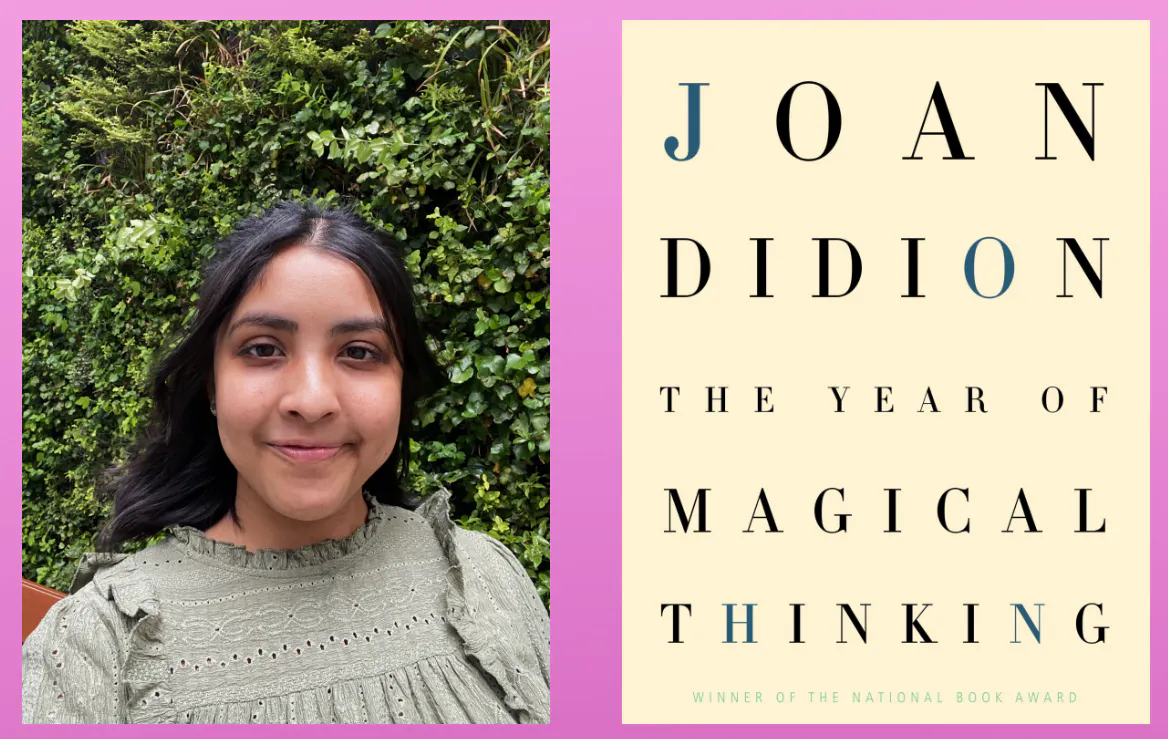Passage That Changed Me: Nadira Begum on Joan Didion’s The Year of Magical Thinking (Öffnet in neuem Fenster)

How Joan Didion helped me understand grief and its many faces
"Grief has no distance. Grief comes in waves, paroxysms, sudden apprehensions that weaken the knees and blind the eyes and obliterate the dailiness of life."
Joan Didion, The Year of Magical Thinking
When I was 16, I came across a book titled The Year of Magical Thinking. I’d never heard of Joan Didion, but the description of a book recounting the year following the death of the author’s husband was intriguing. I was mourning a close family member and found myself drawn to all kinds of media that related to grief in some way – any films, songs, or books that dealt with grief captured my attention. With Didion’s work, however, I bit off more than I could chew. I never finished the book, but not because it was poorly written – I very quickly had to abandon the book after realising that the feelings her words were rousing in me were still too raw. I had just lost my Dada (grandad) a few months prior, and I wasn’t quite ready to face those feelings head-on.
I was 16 and didn’t really know how to process my emotions. Sadness and loss were both overwhelming. Every time I was hit by a wave of grief, I would treat it like a failure on my own part, like I’d somehow been unsuccessful at ‘moving on’ by experiencing these bouts of tremendous sadness. I didn’t return to The Year of Magical Thinking until roughly five years later, at the start of the pandemic, by which point I’d lost my Nani and realised I had no living grandparents left.
I’d also read more of Didion’s work by then, falling in love with Blue Nights and any of her writing I could find online, so I felt somewhat more prepared this time. But there was a particular quote that stopped me in my tracks. On the assumption that one can simply ‘overcome’ grief, Didion writes, "Grief has no distance. Grief comes in waves, paroxysms, sudden apprehensions that weaken the knees and blind the eyes and obliterate the dailiness of life." It was only with time, and after being reminded of this work by a friend, that I felt comforted in the knowledge that the grief I carried around with me wasn’t a marker of failure after all. I spent a long time thinking that not getting over someone’s death was a terrible failure on my brain’s part – it was a somewhat childish notion of grief and ‘growing up’, but it was one I held until my 20s.
"Grief has always felt like a constant companion"
Oddly enough, grief has always felt like a constant companion. I can feel its presence in almost everything. When I was younger, I viewed grief in a romanticised way, like it was this mammoth emotion that consumes your entire being. I watched films about death and let the sadness pour over me, like a blanket weighing me down. I thought you had to be completely, visibly broken for your grief to be believable. I’ve since realised that, like Didion said, grief comes in waves and it doesn’t always look the same. Sometimes it comes quietly, drip-fed from a hazy memory, and sometimes it comes crashing down, with an all-encompassing crescendo of pain and heartbreak forcing me to the ground. For me, it’s the way sarees feel which trigger memories of Eids from my childhood spent in my grandparents’ home – the rough embroidery reminding me of the traditional clothing I would often find them dressed in. Sometimes when I feel the material, I have to take a minute to just let the memories wash over me.
"Grief has changed its appearance to me over the years and now serves as a reminder of all the love I still have for the people I’ve lost"
Grief has changed its appearance to me over the years and now serves as a reminder of all the love I still have for the people I’ve lost. Grief no longer feels like a burden, but rather a doorway to a whole new world of emotions that I didn’t know I was capable of feeling. Grief has given way to love and bittersweet happiness and the realisation that when I’m not overcome with sadness, memories feel sharper somehow, like they’re no longer being obscured by an oppressive grey cloud.
My days aren’t often brought to a halt anymore, but when they are, I know in my heart that that feeling won’t last forever.
"I decided that I needed to continue living without feeling a sense of duty to the past"
Didion writes about grief in a very particular way. It isn’t ephemeral or something you necessarily move past, but a meticulous and tangible process, an ongoing conversation between you and your brain that never really has a definitive end. At some point in the seven years since I first started The Year of Magical Thinking, I decided that I needed to continue living without feeling a sense of duty to the past.
In Didion’s own words: “if we are to live ourselves there comes a point at which we must relinquish the dead, let them go, keep them dead”. While the dead shall remain dead, the memory of their love will always be felt in every ache and pang of my heart, and that is enough to keep me going.


